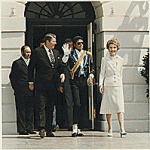Which Declaration of Independence?
 When you are at your Fourth of July cookout or fireworks display this week, see if anyone mentions the Declaration of Independence. If they do, ask “which Declaration of Independence?” After all, there are more than one.
When you are at your Fourth of July cookout or fireworks display this week, see if anyone mentions the Declaration of Independence. If they do, ask “which Declaration of Independence?” After all, there are more than one.
In her 1997 book American Scripture: Making the Declaration of Independence, historian Pauline Maier describes the events leading up to July 4, 1776 and points to multiple “other” Declarations of Independence issued by local legislative bodies earlier that year. Declarations were issued in a variety of places, including Buckingham County (Virginia), Charles County (Maryland), and Natick, Massachusetts. In most cases, these “other” Declarations took the form of instructions from the citizens of a particular geographic area to their elected representatives in the state legislature or in the Continental Congress. After recounting the unjustified treatment of the colonies by the Crown, these documents authorize the peoples’ representatives to vote in favor of severing ties with England. However, some of these Declarations take a different form, such as a judge instructing a grand jury on the source of their legal authority in the absence of a Royal Governor.

 Irene’s recent post on why we love intellectual property gets at its certain power–its ubiquity in everyday life. The recent death of Michael Jackson speaks to that particular ubiquity. What was necessarily powerful about his death was that for kids of a certain generation (maybe if you were born between 1972 and 1980?), his music served, as the pundits keep saying over and over, as the “soundtrack” of our lives. I remember one slumber party where all of the Michael Jackson videos played over and over and over for 24 hours (those poor parents). The summers of 1983 through 1985 were consumed in the great debate (forget US v. USSR) of the middle 1980s: who was better, Michael Jackson or Prince! I was a stone cold Prince fan, who marshaled my arguments as if I was getting ready for battle (Purple! Let’s Go Crazy!, Purple!). I was usually in the minority in that one, as no one could top Michael’s videos (did Prince dance with zombies (No!), could Prince moonwalk (No!), could Prince rock that awesome red jacket (No!)).
Irene’s recent post on why we love intellectual property gets at its certain power–its ubiquity in everyday life. The recent death of Michael Jackson speaks to that particular ubiquity. What was necessarily powerful about his death was that for kids of a certain generation (maybe if you were born between 1972 and 1980?), his music served, as the pundits keep saying over and over, as the “soundtrack” of our lives. I remember one slumber party where all of the Michael Jackson videos played over and over and over for 24 hours (those poor parents). The summers of 1983 through 1985 were consumed in the great debate (forget US v. USSR) of the middle 1980s: who was better, Michael Jackson or Prince! I was a stone cold Prince fan, who marshaled my arguments as if I was getting ready for battle (Purple! Let’s Go Crazy!, Purple!). I was usually in the minority in that one, as no one could top Michael’s videos (did Prince dance with zombies (No!), could Prince moonwalk (No!), could Prince rock that awesome red jacket (No!)).